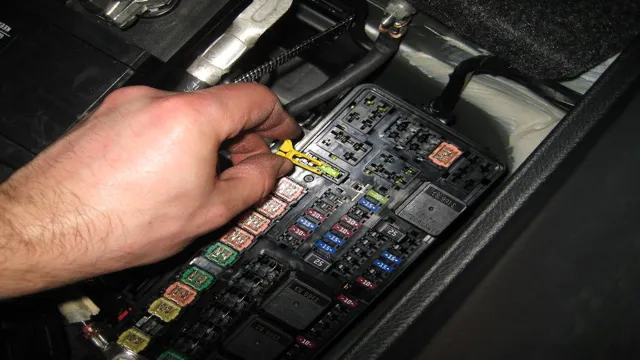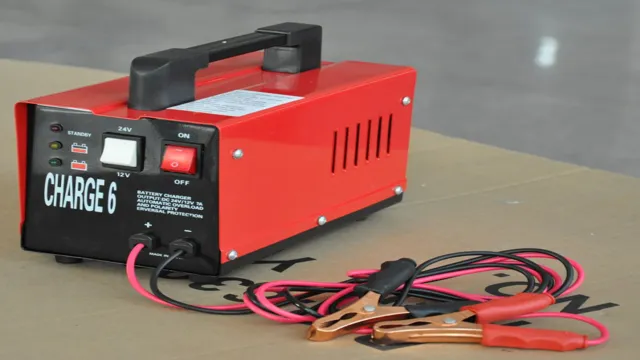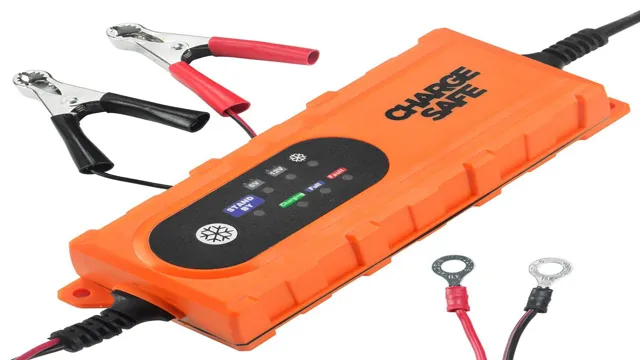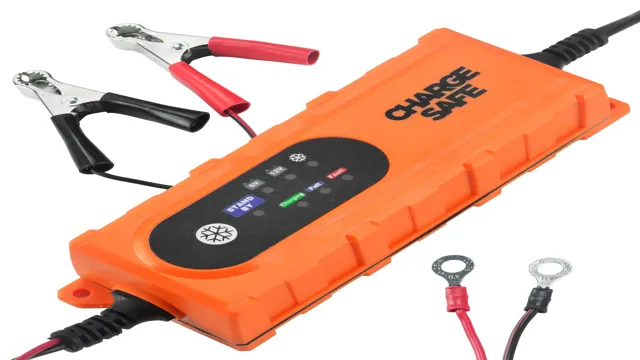What Size Fuse for Car Battery Charger? A Comprehensive Guide

Have you ever been in a situation where your car battery charger just won’t work? One of the most common reasons why this occurs is because of the fuse size. Choosing the right size fuse for your car battery charger is crucial and can be the difference between a successful charge and a failed attempt. Imagine trying to light a fire with a match that’s too short – it just won’t work.
The same concept applies to fuses – if the fuse size is too small, it won’t be able to handle the load and will blow. On the other hand, if the fuse size is too large, it may not blow at all and potentially cause damage to your car battery charger. Fortunately, selecting the right size fuse isn’t complicated and can be done by following a few simple steps.
In this blog post, we’ll guide you through the process of choosing the right size fuse for your car battery charger, so you can get back to charging your car battery with ease.
Understanding Fuses
When it comes to using a car battery charger, it’s important to understand the role of fuses in the process. Fuses are designed to protect electrical circuits from damage caused by overloading or short-circuiting. The size of the fuse needed depends on the amperage rating of the charger and the maximum amperage capacity of the car’s electrical system.
For a standard car battery charger with a rating of around 10-20 amps, a 20-30 amp fuse should be suitable. However, it’s always important to refer to the manufacturer’s instructions or consult with a professional to ensure the correct fuse is being used. Failure to use the correct size of fuse can result in damage to the charger, the car’s electrical system, and even personal injury.
So, always make sure to handle fuses with care and follow safety protocols when working with automotive electrical systems.
What are fuses and why are they important?
Fuses are essential safety components found in electrical systems that protect them from damage due to excessive current flow. They work by interrupting the flow of electric current when it exceeds a safe level, preventing equipment damage and potentially dangerous situations like fires or electrocution. Understanding fuses is crucial for anyone working with electrical systems, as a blown fuse can indicate problems like circuit overload, short circuits, or malfunctioning equipment.
Fuses come in various types and ratings, so it’s important to use the right one for each application to ensure effective protection. To put it simply, fuses act as the security guards of an electrical system, ensuring that only safe levels of electricity pass through, keeping everything and everyone safe.

How do fuses work?
Fuses are an essential component of electrical systems, as they provide protection against overloading and short circuits. When a surge of electricity exceeds the rated amperage of a circuit, the fuse is designed to melt and break the connection, preventing damage to the wiring or equipment. Fuses consist of a metal filament in a glass or ceramic casing, which melts when exposed to excessive current.
This interruption of the electric flow stops the surge from damaging the circuit or equipment. The types of fuses vary depending on the application, from residential to commercial and industrial settings. It’s important to choose the right fuse for the intended use, as a fuse rated too high for the circuit increases the risk of damage or fire.
By regularly checking and replacing fuses, and following proper electrical safety practices, we can ensure our electrical systems are running at their safest and most efficient.
Determining the Correct Fuse Size for Your Charger
If you’re wondering what size fuse for car battery charger, it’s essential to understand that the size of the fuse you need will depend on the charger’s amperage rating. Fuses are designed to protect electric circuitry in the event of overloading, and selecting the correct fuse size is critical in preventing damage or hazards. Most car battery chargers come with a recommended fuse size printed on the equipment, so it’s crucial to check the label before making a purchase.
A general rule of thumb is to choose a fuse that can handle slightly more amperage than what the charger requires to ensure maximum protection. Remember never to neglect the importance of using the right fuse size to guarantee the safety and longevity of your car battery charger.
Check your charger’s manual
When it comes to determining the correct fuse size for your charger, the best place to start is by checking your charger’s manual. The manual should provide you with all the information you need to know, including the recommended fuse size. This information is essential because using the wrong fuse size can be dangerous.
If the fuse is too small, it can blow easily and cause a short circuit. On the other hand, if the fuse is too large, it may not provide adequate protection against overloading or short circuits, potentially leading to damage to your charger or even a fire hazard. So, make sure to refer to your charger’s manual and follow the manufacturer’s instructions to ensure the correct fuse size is being used every time you charge your device.
By doing this, you’ll not only protect your charger but also your safety.
Look at the amperage of your charger
When it comes to determining the correct fuse size for your battery charger, it’s essential to look at the amperage of your charger. The amperage of your charger is the amount of electrical current that flows through it. It’s also important to make sure that the fuse’s amperage rating matches or is slightly higher than the charger’s amperage rating.
Going with the correct fuse size helps ensure the safety of your charger, preventing it from overheating or causing short circuits that could damage your equipment or pose a fire hazard. A simple way to determine your charger’s amperage rating is to check the label on the charger itself or look at the user manual that came with it. Choosing the correct fuse size for your charger is a small, but crucial step towards keeping your devices safe and functioning optimally.
Calculate the required fuse size based on your charger’s amperage
If you’re using a charger, it’s essential to ensure that you’re using the correct fuse size to protect your device from any damage. The fuse is designed to cut off any electrical flow in case the charger overheats or is overloaded to prevent any accidents or fires. To determine the correct fuse size that you need, you must check the amperage of your charger.
The amperage is a measure of the electric current flowing through the charger. Once you know the amperage, you can use Ohm’s law to calculate the correct fuse size. Simply divide the wattage of the charger by the voltage, then divide the result by the amperage.
For instance, if your charger is rated 120 watts at 120 volts and 2 amperes, divide 120 by 120 to come up with one. Divide the result by
2 to determine that you need to use a fuse that is less than one Ohm. This will ensure that the fuse will be active when the current exceeds 2 A.
By calculating the correct fuse size, you’ll be sure that your charger is well-protected, and you’ll be able to continue using it safely without any concern for damage or accidents.
Common Fuse Sizes for Car Battery Chargers
If you’re in the market for a new car battery charger, it’s important to understand the common fuse sizes associated with these devices. Typically, you’ll find that car battery chargers use either 10 or 15-amp fuses. The exact size you need will depend on the specific make and model of your charger, so be sure to check your owner’s manual or consult with the manufacturer.
It’s important to use the correct size fuse to ensure safe and efficient charging of your car battery. Using an incorrect size fuse could result in damage to your vehicle’s electrical system or cause problems with the charger itself. So, make sure you do your research and choose the right size fuse for your car battery charger.
5-amp fuses
When it comes to car battery chargers, the fuses are an important component to consider. One of the most common fuse sizes for car battery chargers is the 5-amp fuse. This size fuse is often used in chargers that are designed for smaller vehicles, such as motorcycles or ATVs.
However, it’s important to note that the fuse size may need to be adjusted based on the specific charger and vehicle being used. It’s always a good idea to refer to the owner’s manual or consult with a professional to ensure that the right fuse size is being used. Using the wrong size fuse can not only damage the charger, but it can also pose a safety risk.
So, make sure to pay attention to the fuse size and keep your battery charger in top condition.
10-amp fuses
When it comes to car battery chargers, it’s essential to know the right fuse size to keep your charger and your vehicle safe. One of the most common fuse sizes for car battery chargers is the 10-amp fuse. The 10-amp fuse is built to handle up to 120 watts of electricity, making it perfect for smaller cars or motorcycles.
However, it’s important to note that different battery chargers may require different fuse sizes, and using the wrong size can cause damage to both the charger and the car battery. Always double-check the manufacturer’s instructions for the recommended fuse size and make sure to replace any blown or damaged fuses promptly. Remember to prioritize safety and take the necessary precautions when working with electrical equipment, including wearing protective gear and unplugging the charger before attempting any repairs.
With the right fuse size and proper care, you can keep your car battery charged and ready to go whenever you need it.
15-amp fuses
When it comes to car battery chargers, knowledge of the common fuse sizes is essential. One of the most popular sizes used in these chargers is the 15-amp fuse. This fuse size is suitable for charging most car batteries and provides sufficient protection against overloading, short-circuiting, and other electrical faults.
However, it’s important to remember that different chargers may require different fuse sizes, so it’s essential to check the manufacturer’s specifications before replacing a blown fuse. Additionally, maintaining and testing your charger regularly will help prevent fuse-related issues and ensure the long-term functionality of your car battery charger. So, if you’re in doubt about the appropriate fuse size for your car battery charger, it’s best to seek the advice of an expert or consult the user manual.
Final Thoughts and Safety Precautions
When it comes to choosing the right fuse size for your car battery charger, it’s important to consider the amperage rating of both your charger and your vehicle’s battery. The fuse acts as a safety device to protect against any potential shorts or overloads that may occur during the charging process. If the fuse is too small, it can blow prematurely and prevent your battery from charging properly.
On the other hand, if the fuse is too large, it may not provide the necessary level of protection and could potentially lead to damage or even a fire hazard. Typically, a good rule of thumb is to use a fuse that is rated for around 5 times the maximum amperage draw of your charger.
This will provide ample protection while still allowing for efficient charging. However, it’s always a good idea to refer to your charger’s user manual or consult with a professional to ensure that you’re choosing the right fuse size for your specific needs and equipment. Ultimately, taking the time to properly select and install the right fuse can help ensure safe and reliable charging for your car battery.
Conclusion
In conclusion, choosing the right size fuse for your car battery charger is crucial for both efficiency and safety reasons. It’s always recommended to consult your user manual or seek professional advice to avoid any potential mishaps. Remember, just like Goldilocks and her three bears, you want to choose the fuse that’s just right- not too big, not too small, but just perfect for powering up your ride! “
FAQs
What is the purpose of a fuse in a car battery charger?
The purpose of a fuse in a car battery charger is to protect it from electrical surges and prevent damage to the charger or the car battery.
What size fuse is recommended for a car battery charger?
The recommended fuse size for a car battery charger can vary depending on the charger’s amperage. It is best to consult the manual or manufacturer’s specifications for the correct fuse size.
Can I use a higher amperage fuse in my car battery charger?
No, using a higher amperage fuse than recommended in a car battery charger can be dangerous and damage the charger or the car battery. Always use the recommended fuse size.
What happens if a fuse in a car battery charger blows?
If a fuse in a car battery charger blows, it will prevent the charger from functioning until the fuse is replaced. This protects the charger and the car battery from potential damage.
How do I know if the fuse in my car battery charger needs to be replaced?
If the charger is not functioning, it may be due to a blown fuse. Check the fuse for any damage or use a multimeter to test for continuity. If there is no continuity, the fuse needs to be replaced.
Can I replace the fuse in my car battery charger myself?
Yes, replacing the fuse in a car battery charger is a simple process that can be done at home. However, it is important to use the correct fuse size and follow any manufacturer instructions.
What should I do if the fuse in my car battery charger continues to blow?
If the fuse in a car battery charger continues to blow, it may be due to a problem with the charger or the car battery. It is recommended to have a professional inspect and repair the charger or battery.



